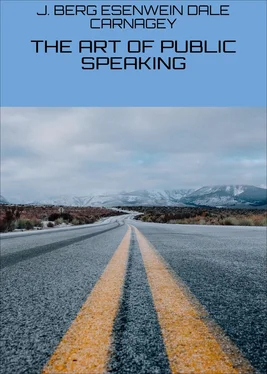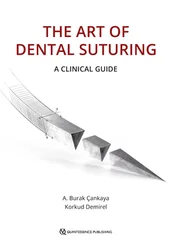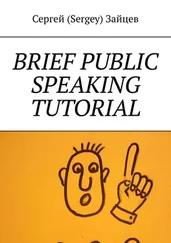to soak in. The farmer's wife follows this same principle in doing her
washing when she puts the clothes in water--and pauses for several hours
that the water may soak in. The physician puts cocaine on your
turbinates--and pauses to let it take hold before he removes them. Why
do we use this principle everywhere except in the communication of
ideas? If you have given the audience a big idea, pause for a second or
two and let them turn it over. See what effect it has. After the smoke
clears away you may have to fire another 14-inch shell on the same
subject before you demolish the citadel of error that you are trying to
destroy. Take time. Don't let your speech resemble those tourists who
try "to do" New York in a day. They spend fifteen minutes looking at the
masterpieces in the Metropolitan Museum of Arts, ten minutes in the
Museum of Natural History, take a peep into the Aquarium, hurry across
the Brooklyn Bridge, rush up to the Zoo, and back by Grant's Tomb--and
call that "Seeing New York." If you hasten by your important points
without pausing, your audience will have just about as adequate an idea
of what you have tried to convey.
Take time, you have just as much of it as our richest multimillionaire.
Your audience will wait for you. It is a sign of smallness to hurry. The
great redwood trees of California had burst through the soil five
hundred years before Socrates drank his cup of hemlock poison, and are
only in their prime today. Nature shames us with our petty haste.
Silence is one of the most eloquent things in the world. Master it, and
use it through pause.
* * * * *
In the following selections dashes have been inserted where pauses may
be used effectively. Naturally, you may omit some of these and insert
others without going wrong--one speaker would interpret a passage in one
way, one in another; it is largely a matter of personal preference. A
dozen great actors have played Hamlet well, and yet each has played the
part differently. Which comes the nearest to perfection is a question
of opinion. You will succeed best by daring to follow your own
course--if you are individual enough to blaze an original trail.
A moment's halt--a momentary taste of being from the well amid
the waste--and lo! the phantom caravan has reached--the nothing
it set out from--Oh make haste!
The worldly hope men set their hearts upon--turns ashes--or it
prospers;--and anon like snow upon the desert's dusty
face--lighting a little hour or two--is gone.
The bird of time has but a little way to flutter,--and the bird
is on the wing.
You will note that the punctuation marks have nothing to do with the
pausing. You may run by a period very quickly and make a long pause
where there is no kind of punctuation. Thought is greater than
punctuation. It must guide you in your pauses.
A book of verses underneath the bough,--a jug of wine, a loaf of
bread--and thou beside me singing in the
wilderness--Oh--wilderness were paradise enow.
You must not confuse the pause for emphasis with the natural pauses that
come through taking breath and phrasing. For example, note the pauses
indicated in this selection from Byron:
But _hush!_--_hark!_--that deep sound breaks in once more,
And _nearer!_--_clearer!_--_deadlier_ than before.
_Arm_, ARM!--it is--it is the cannon's opening roar!
It is not necessary to dwell at length upon these obvious distinctions.
You will observe that in natural conversation our words are gathered
into clusters or phrases, and we often pause to take breath between
them. So in public speech, breathe naturally and do not talk until you
must gasp for breath; nor until the audience is equally winded.
A serious word of caution must here be uttered: do not overwork the
pause. To do so will make your speech heavy and stilted. And do not
think that pause can transmute commonplace thoughts into great and
dignified utterance. A grand manner combined with insignificant ideas is
like harnessing a Hambletonian with an ass. You remember the farcical
old school declamation, "A Midnight Murder," that proceeded in grandiose
manner to a thrilling climax, and ended--"and relentlessly murdered--a
mosquito!"
The pause, dramatically handled, always drew a laugh from the tolerant
hearers. This is all very well in farce, but such anti-climax becomes
painful when the speaker falls from the sublime to the ridiculous quite
unintentionally. The pause, to be effective in some other manner than in
that of the boomerang, must precede or follow a thought that is really
worth while, or at least an idea whose bearing upon the rest of the
speech is important.
William Pittenger relates in his volume, "Extempore Speech," an instance
of the unconsciously farcical use of the pause by a really great
American statesman and orator. "He had visited Niagara Falls and was to
make an oration at Buffalo the same day, but, unfortunately, he sat too
long over the wine after dinner. When he arose to speak, the oratorical
instinct struggled with difficulties, as he declared, 'Gentlemen, I have
been to look upon your mag--mag--magnificent cataract, one hundred--and
forty--seven--feet high! Gentlemen, Greece and Rome in their palmiest
days never had a cataract one hundred--and forty--seven--feet high!'"
1. Name four methods for destroying monotony and gaining power in
speaking.
2. What are the four special effects of pause?
3. Note the pauses in a conversation, play, or speech. Were they the
best that could have been used? Illustrate.
4. Read aloud selections on pages 50-54, paying special attention to
pause.
5. Read the following without making any pauses. Reread correctly and
note the difference:
Soon the night will pass; and when, of the Sentinel on the
ramparts of Liberty the anxious ask: | "Watchman, what of the
night?" his answer will be | "Lo, the morn appeareth."
Knowing the price we must pay, | the sacrifice | we must make, |
the burdens | we must carry, | the assaults | we must endure, |
knowing full well the cost, | yet we enlist, and we enlist | for
the war. | For we know the justice of our cause, | and we know,
too, its certain triumph. |
Not reluctantly, then, | but eagerly, | not with faint hearts, |
but strong, do we now advance upon the enemies of the people. |
For the call that comes to us is the call that came to our
fathers. | As they responded, so shall we.
"He hath sounded forth a trumpet | that shall never call retreat,
He is sifting out the hearts of men | before His judgment seat.
Oh, be swift | our souls to answer Him, | be jubilant our feet,
Our God | is marching on."
--ALBERT J. BEVERIDGE, _From his speech as temporary chairman of
Progressive National Convention, Chicago, 1912_.
6. Bring out the contrasting ideas in the following by using the pause:
Contrast now the circumstances of your life and mine, gently and
with temper, Æschines; and then ask these people whose fortune
they would each of them prefer. You taught reading, I went to
school: you performed initiations, I received them: you danced
in the chorus, I furnished it: you were assembly-clerk, I was a
speaker: you acted third parts, I heard you: you broke down, and
I hissed: you have worked as a statesman for the enemy, I for my
country. I pass by the rest; but this very day I am on my
Читать дальше












